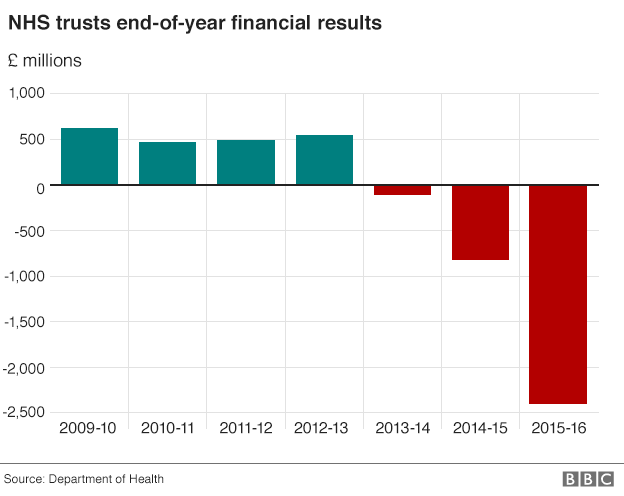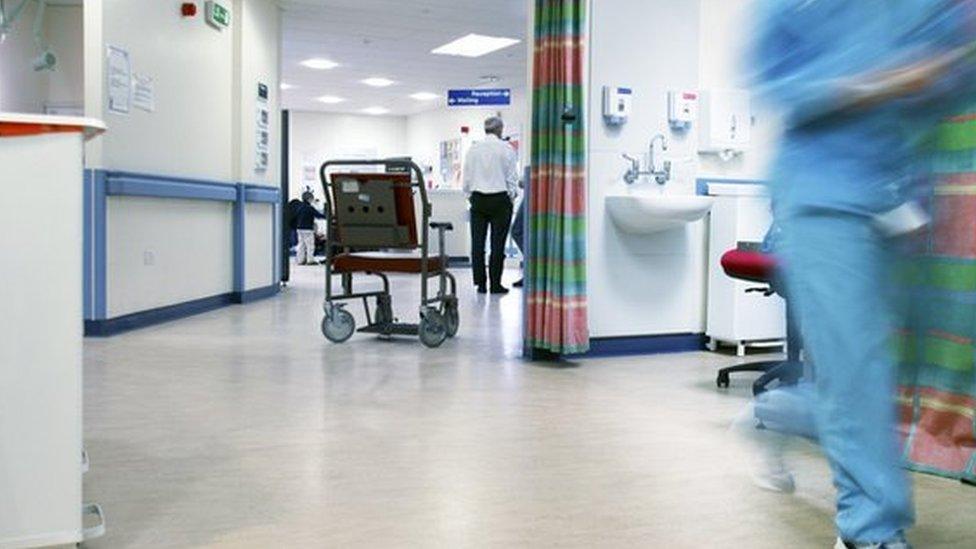What will it take to unblock "bed blocking"?
- Published

The NHS in the West Midlands is about to undergo some radical surgery
Sheer weight of numbers does not always reveal a true picture: (lies, damned lies etc....).
But in the case of the health service, latest figures undoubtedly shine a penetrating, clinical, light on the rate at which budget deficits are currently being racked-up.
According to BBC analysis, they are set to exceed £2bn in the West Midlands alone by 2020.
That is clearly unsustainable. But what's to be done?
Suddenly we are all having to digest the latest ingredient in the alphabet soup of public service abbreviations: STPs.

Council and health executives across the Midlands have so far produced seven "Sustainability and Transformation Plans".
Their principal objective seems to be to curb our over-reliance on the most expensive form of healthcare of all, our hospitals.
And as their name suggests, they involve radical surgery: No 'transformation', no 'sustainability'.
Those first seven STPs propose closing one hospital in the Black Country and the closure or downgrading of A&E departments in Telford or Shrewsbury, Burton or Stafford, and Nuneaton.
On top of this, 400 community beds would go in Herefordshire, Worcestershire and Staffordshire.
Urgent questions
1. There was no mention of anything on this drastic scale in the Conservatives' manifesto, so where is the government's mandate for it?

This winter seemed to see unprecedented levels of patients waiting on trolleys in our hospitals
2. How can this be achieved against the urgent timescales dictated by those rising deficits, given the need for consultation and careful reorganisation? Already the so-called "Future Fit" tug-of-war over centralising hospital services in Shrewsbury or Telford is starting to make "War and Peace" look like a short story
3. Isn't this whole subject politically toxic? The former University of Birmingham professor, Chris Ham, who now heads the health charity the King's Fund, says politicians need to have "an honest conversation" with the public about the future of the NHS. But why would they? Remember Kidderminster? Having accepted the clinicians' proposals for closing the town's local district general hospital, the Labour MP David Lock became engulfed in a seething ferment of protest which cost him his Wyre Forest seat in 2001. Retired consultant Dr Richard Taylor duly began his two terms as the Independent MP and so became the figurehead of what became known as "People Power". No wonder few MPs since then have been willing to accept radical cutbacks to local hospital services.
4. But perhaps the most pressing question of all is how can the number of hospital beds possibly be reduced when they are currently working at, near, or often above capacity? This winter has seen an unprecedented catalogue of "trolley waits" in A&E departments from Worcester to Stoke-on-Trent deemed "unacceptable" by the Health Secretary Jeremy Hunt himself.
Unblocking bed blocking
There is clearly no single or simple solution to the increasingly complex tangle of woes besetting the NHS.
But an easing of the "bed blocking" impasse would certainly go a long way.
In calling for that debate about health, Professor Ham is determined that the "community investment" must come first, before any curtailment of hospital provision.
He's talking about the 'care gap' which requires extra social care to be made available for patients who are well enough to be discharged from hospital, but who must remain exactly where they are until somewhere can be found where they can be cared for.

Are patients being denied hospital beds whilst others, well enough to go home, have to wait for care to be sorted for them
This in turn denies hospital beds to other patients awaiting treatment and leads to the sort of chronic delays witnessed in local hospitals over the winter.
Figures just published by the King's Fund put our region at the wrong end of yet another unwelcome league table: Stoke ranks as the 134th worst-affected, Coventry 144th and Birmingham 145th on the list of 153 cities struggling to unblock their hospital beds.
Budgeting for health
One glimmer of hope has come from the Office for Budgetary Responsibility. Their latest figures show higher than expected tax receipts which have given Chancellor Philip Hammond about £12bn more wriggle room than he expected, as he prepares to deliver the first of this year's two Budgets on Wednesday of next week (8th March 2017).
Inevitably this has triggered a sudden flurry of speculation that he may be able to find some extra funding for adult social care, over and above the extra 3% local authorities are allowed to add to council tax for the next two years. But he may choose to hold on to his windfall for fear of a post-Brexit economic 'dip' which may put him under pressure by the time of this year's second Budget in the Autumn.
All of which adds up to a vicious circle of debts, spending cuts, delays and taxes.
By now you will have realised that we have so much to talk about in this weekend's Sunday Politics. Joining me in the studio will be Jeremy Wright, the Attorney General and Conservative MP for Kenilworth and Southam; Gisela Stuart, Labour MP for Birmingham Edgbaston and former Health Minister; and Stephen Dorrell, the former Conservative Health Secretary who now chairs the NHS Confederation and is also leading a five year health and social care project in Birmingham and Solihull.
And I hope you will be able to join us too. Sunday Politics Midlands is in its usual 11.00 slot on BBC One this Sunday morning, 5th March 2017.